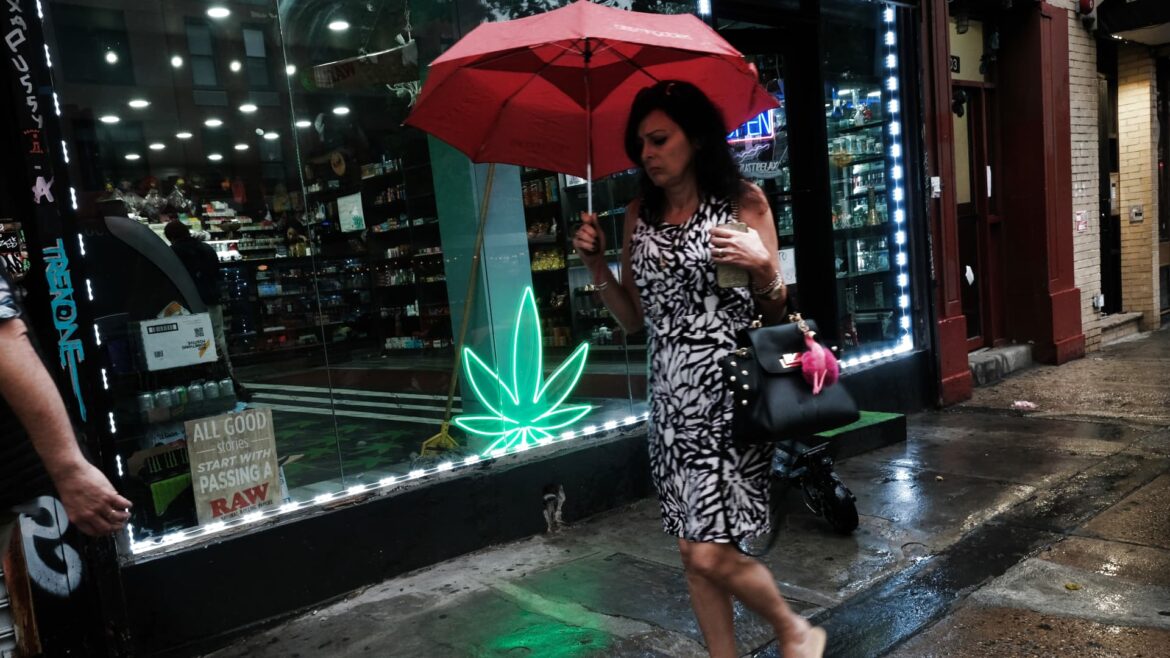A woman walks by a smoke shop in New York City that displays a marijuana leaf in the window, June 16, 2023.
Spencer Platt | Getty Images News | Getty Images
Coss Marte’s marijuana dispensary in lower Manhattan has already cost him over $1 million, and it’s not even open yet.
He was awarded a coveted dispensary license last year on the basis of his prior marijuana-related convictions. It was a part of New York’s Conditional Adult Use Retail Dispensary, or CAURD, program, which has thus far limited retail licenses only to this group.
But now, as the state tries to boost the slow-moving legal weed rollout, Marte’s business is one of hundreds in limbo and potentially on the brink of ruin as the state prepares to release general licenses.
“I could go bankrupt,” Marte said.
In addition to the obstacles faced in finding locations and funding required to open dispensaries, lawsuits have prevented most CAURD licensees from getting their businesses up and running.
On Tuesday, the state’s Cannabis Control Board voted for new regulations that would expand New York’s meager marketplace for legal weed by allowing a wider range of applicants. The state has struggled to open enough dispensaries and meet demand amid regulatory hurdles and a thriving illicit market.
“Today marks the most significant expansion of New York’s legal cannabis market since legalization, and we’ve taken a massive step towards reaching our goal of having New Yorkers being able access safer, regulated cannabis across the state,” Chris Alexander, executive director of the Office of Cannabis Management, or OCM, said in a statement Tuesday.
Entrepreneurs already awarded licenses feel as though they’ve been left behind.
New York has prioritized retail licenses for people who had been convicted of marijuana offenses before weed became legal in 2021. It’s part of a restorative justice effort aimed at giving those affected by prohibition a chance to get their footing before large companies enter the industry.
But lawsuits by medical marijuana and veterans groups have paused the program and barred New York regulators from issuing more licenses or opening businesses for existing licenses. The groups argue the program is unconstitutional.
As a result, across the state, only 23 of these licensees have opened their businesses. The vast majority, over 400, have been unable to open. In the meantime, some 1,500 unlicensed businesses have been operating in New York City alone.
Tuesday’s announcement made no mention of these licensees or the legal challenges to their legitimacy.
“This could really mess up my whole entire life,” Marte said. “I may not be able to come back from this.”
‘Monumental’ change or a ‘nightmare’?
Starting in October, applications for licenses will become available to the general public, as well as large multistate manufacturers and medical companies, for retail, cultivation, processing and distribution.
The move will pave the way for big players — including Columbia Care, Cresco Labs, Curaleaf, Green Thumb and Ascend Wellness Holdings — to get in on the action.
The new framework is likely to be a boon for the state’s fledgling legal market, which needs more dispensaries to boost sales and tax revenues.
As of late August, the state’s licensed dispensaries have reported cumulative sales of over $70 million, according to the Cannabis Control Board. At maturity, New York’s recreational market should be generating over $1 billion annually by 2025, growing to $4.41 billion by 2030, according to New Frontier Data, a marijuana research firm. That will put it on par with states such as California, which has so far generated $4.51 billion this year, the firm found.
By broadening eligibility requirements for participation in the legal industry, New York is back on track to meet these targets, said Jeff Schultz, a marijuana attorney at Foley Hoag.
“This is monumental,” Schultz said. “New York needs hundreds of retailers open to meet the existing consumer demand and to move all of the product tied up in the supply side of the current market.”
Marte, who was awarded a CAURD license in April 2022 after serving prison time for dealing drugs, said he’s invested hundreds of thousands of dollars into opening his dispensary on Manhattan’s Lower East Side.
Yet, amid the pause and ongoing litigation, Marte’s been unable to open, and his location sits empty.
When contacted by CNBC, the OCM said it cannot comment on pending litigation.
“I just want to express on behalf of the office a continued commitment to the success of those licensees,” Alexander said Tuesday of the CAURD businesses. “We will continue to work diligently.”
The uncertainty nonetheless haunts Marte.
“It was an opportunity that was a dream,” he said. “And now it’s become a nightmare.”


